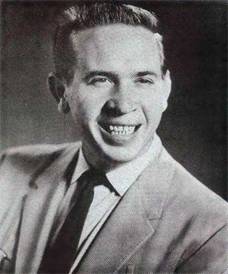BUCK OWENS
'Tales From The Woods' raises a glass also to legend of country music 'Buck' Owens who died on 25th March 2006, aged 76.
Born Alvis Edgar Owens, on 12th August 1929; into a family of poor white sharecroppers in Sherman, Texas, he was nicknamed Buck as a toddler in honour of a well-loved mule that laboured on the farm. His formative years were scarred by grinding poverty made even worse by the dust bowl storms of the mid thirties that forced untold millions of displaced farm labourers to migrate west. The Owens family did likewise in 1937 but were unable to make it to the promised land of California, quitting in Arizona after their trailer broke down in Phoenix.
By the time he was 13, young Buck’s schooldays were over, working from dawn to dusk in the fields; somehow though, he still found time to teach himself to play guitar. Come 1951 Owens moved to Bakersfield, California where he would spend the rest of his life. Even at this period the town already had a reputation as a stronghold of country music - or country & western as it was called in those days - the reason being that Bakersfield had been sustained by the dust bowl migrants and naturally they took their music with them. Soon he would be playing in a honky-tonk band called Bill Woods (no relation – H) and the Orange Blossom Playboys who had a residency at a place called The Blackboard, by all accounts the epicentre of the Bakersfield scene.

Around the same period of time he found himself travelling to Los Angeles to work as a session guitarist, his recording debut being on Tommy Collins’ 1953 recording of “You Better Not Do That”, developing a distinctive twanging style on his solid body Fender Telecaster guitar and singing in a gritty characterful voice. By now Buck was being kept pretty busy appearing on sessions by Sonny James, Wanda Jackson, Tommy Sands and of course with Gene Vincent.
In the mid fifties Buck recorded under the name of Corky Jones to cut rockabilly whilst using his own name to cut country, both pseudonyms appearing on Pep Records. Signing to Capitol Records in March 1957 he had to wait until his fourth release before he made any sort of impression with “Second Fiddle” which reached number 24 on Billboard’s country chart. The follow up, “Under Your Spell” made number 4 paving the way for over 75 country hits, around 40 of which made the top ten in the country charts.
Among the biggest were “Act Naturally" (1963) which was later covered by The Beatles, hitting number one on the country charts with “Love’s Gonna Live Here” (1963), “My Heart Skips A Beat” (1964), "Together Again" (1964), "I've Got a Tiger by the Tail" (1965), “Waitin' In Your Welfare Line” (1966), “Think Of Me” (1966), “Open Up Your Heart” (1969) and a 1969 cover of Chuck Berry’s Rock'n'Roll classic, “Johnny B. Goode”. Owens recorded a number of duets with Susan Raye and with his son Buddy Alan.
During his long career he released over 100 albums and, in addition, his compositions were hits by other artists, most notably Emmylou Harris‘ “Together Again" and Ray Charles’ “Crying Time”. Owens’ band The Buckaroos (guitarist Don Rich, bassist Doyle Holly, steel guitarist Tom Brumley and drummer Willie Cantu) were also highly regarded for their “down to basics” honky-tonk instrumental style, very much defining the Bakersfield sound, a reaction against the sweet, schmaltzy sound associated with Nashville. The Buckaroos also recorded several albums in their own right.
In 1969 Buck joined as co-host of the country music show on national television across the U.S. “Hee-Haw” which combined comedy sketches and live music from country stars, staying with the show until the mid eighties, long after his contract with Capitol Records had expired. Signing with Warner Brothers in 1976 he continued to spasmodically place singles in the country charts. His reign as a top country act had faltered, retiring from recording and performing to concentrate on running a number of successful business interests.
In 1988 country newcomer Dwight Yoakam convinced Owens to join him in recording a remake of an Owens song “Streets Of Bakersfield”. It reached the top spot in the country charts and Buck was forced back into the spotlight, re-signing with Capitol Records later that same year and recording a new album “Hot Dog” which included covers of Chuck Berry and Eddie Cochran material.
Owens was elected to the Country Music Hall Of Fame and the Nashville Songwriters Hall Of Fame in 1996 and continued to perform mostly at his own venue, Crystal Palace, where he had played only hours before he died at home. In recent years he had been plagued by ill health suffering a stroke and undergoing surgery for cancer in 1993.
He is survived by three sons.

L L L L